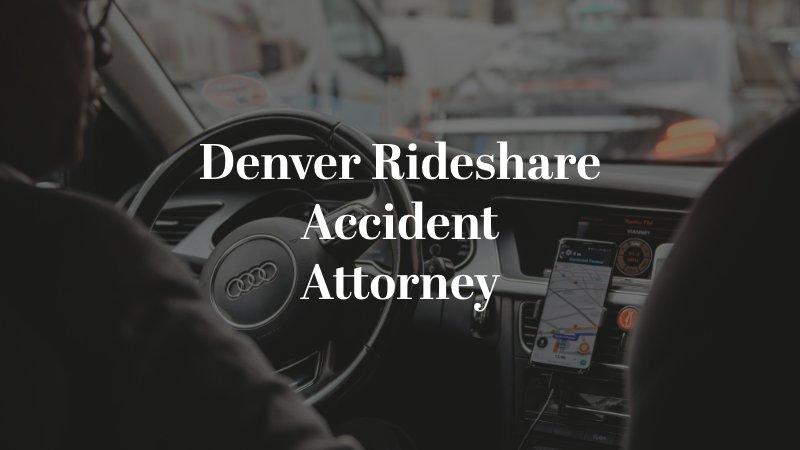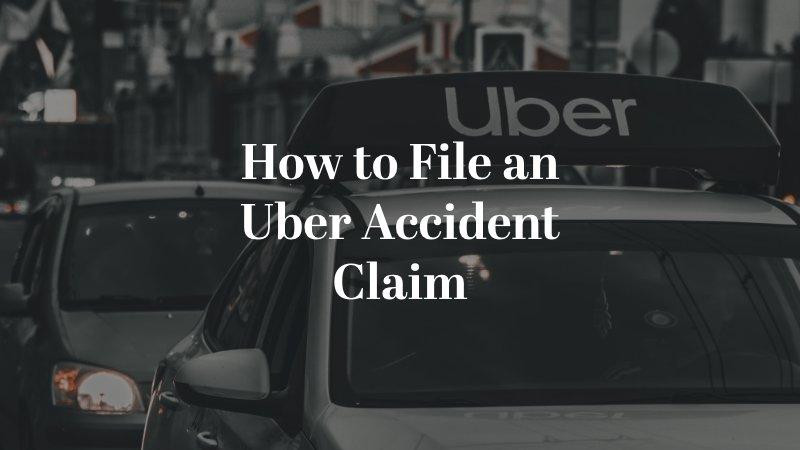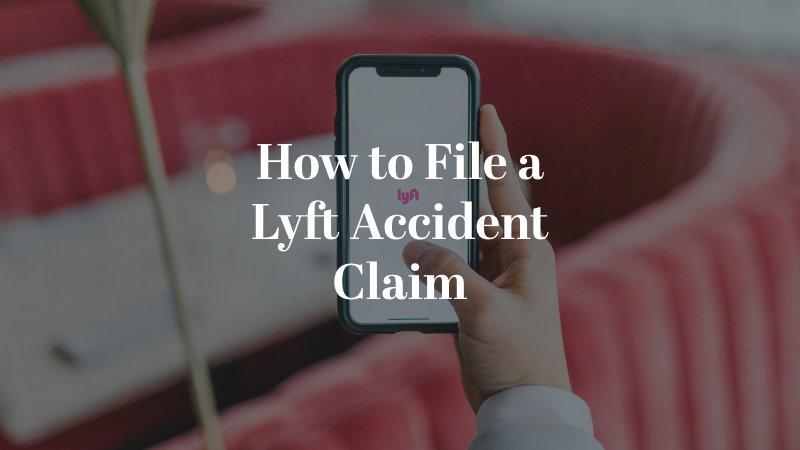The ride-sharing industry greatly benefits Denver residents and those living throughout Colorado. However, despite all the benefits of the ridesharing industry, there can be drawbacks – especially when an individual experiences a wreck causing a personal injury due to a ridesharing driver’s negligent action or inaction.
If this describes something you or a loved one is experiencing, just know that the Denver car crash attorneys of Dulin McQuinn Young are on your side. Our track record of success is highlighted by decades of experience and millions of dollars won.
So if you or a loved one has been injured in a ridesharing accident in Denver, reach out to our team today to book your free, no-obligation case review and consultation.
Our Denver Uber & Lyft accident lawyers are ready to get to work on your ridesharing accident case.

“I highly recommend Dulin McQuinn Young. I was in a car accident and it was a relief to hand over my claim to them. They explained the entire process and were a pleasure to work with.”
-K. M.
Quick Links
- What a Denver Rideshare Accident Lawyer Can Do For You
- How to File an Uber Accident Claim in Denver
- How to File a Lyft Accident Claim in Denver
- Understanding Uber and Lyft Insurance Coverage
- Potential Damages From Uber Or Lyft Accident Cases In Denver
- What is the Deadline to File a Rideshare Accident Claim in Colorado?
- Can I File a Claim If I Was Partially at Fault for an Uber or Lyft Crash?
- Resources for Rideshare Accidents in Colorado
- Schedule a Free Consultation
What a Denver Rideshare Accident Lawyer Can Do For You
On the surface, rideshare accidents may appear like any other car accident. However, rideshare accidents often produce complex legal liability claims between multiple parties and their insurance companies.
The best way to protect yourself from rideshare insurance company tactics to reduce your claim’s value, deny your claim, or shift blame for the accident is to retain experienced legal counsel. At Dulin McQuinn Young, our Uber & Lyft accident lawyers will fight for your legal rights and defend your compensation claim from insurance adjusters who might otherwise take advantage of your situation.
Dulin McQuinn Young will meet with you at no cost and advise you of your legal options. If you have a claim against the rideshare company, a Denver injury lawyer from our firm will handle all insurance company and rideshare calls and correspondence, allowing you to focus on your physical recovery.
How we can help:
- Manage any other driver’s insurance company correspondence along with your own company (when involved);
- Investigate the accident;
- Gather eyewitness testimony and documentary evidence;
- Hire necessary experts;
- Total your medical expenses and damages, and estimate your future accident-related needs;
- Negotiate a fair settlement with any insurance companies;
- File an accident lawsuit in the appropriate court;
- Litigate your case if the insurance company fails to offer a reasonable settlement.
Dulin McQuinn Young will make sure you understand Colorado’s rideshare laws and how they apply to your circumstances. We want you to feel comfortable and well-informed throughout the personal injury claims process.
While few rideshare claims go to court, rest assured your case will be trial-ready. Dulin McQuinn Young was built by trial lawyers with a history of successful jury verdicts.
Do not leave your rideshare accident claim to chance. Call Dulin McQuinn Young now. Our Uber & Lyft attorneys can skillfully guide you through your rideshare accident claim.

How to File an Uber Accident Claim in Denver
If you were involved in an accident while riding in or struck by an Uber vehicle in Denver, you may be entitled to compensation. Uber provides insurance coverage for passengers, pedestrians, and drivers of other vehicles when their drivers are using the app, but the claims process can be confusing.
Here’s what to do:
- Get medical attention immediately. Even minor injuries can worsen over time.
- Call the police and file a report. Request a copy for your records.
- Report the incident to Uber through the app under “Help” > “Trip Issues and Refunds.”
- Collect evidence, including photos of the vehicles, accident scene, injuries, and contact information for witnesses.
- Keep all medical and expense records. These will be crucial to your claim.
- Speak to a rideshare accident attorney. Insurance companies may offer low settlements or deny liability. An attorney can help protect your rights and maximize your compensation.
Uber’s insurance coverage only applies if the driver was using the app at the time. A Denver Uber accident attorney can help determine whether Uber’s policy or the driver’s personal insurance is responsible.

How to File a Lyft Accident Claim in Denver
Injured in a Lyft ride in Denver? Whether you were a passenger, pedestrian, or occupant of another vehicle, you may be eligible for compensation through Lyft’s insurance coverage, depending on the driver’s status at the time of the crash.
Here’s how to file a claim:
- Prioritize your health. Seek immediate medical attention.
- Contact the police and file an official report.
- Report the accident to Lyft using the app or their website (Help > Safety and Security).
- Gather key details, including the driver’s name, time and location of the crash, vehicle info, and witness statements.
- Save all documentation, including medical bills, repair invoices, and communication with Lyft or insurers.
- Consult a personal injury lawyer. Lyft’s insurance adjusters may pressure you to settle quickly. Legal guidance can help you recover full compensation for medical bills, lost income, and more.
Lyft’s coverage depends on whether the driver was using the app and actively on a ride. Your Denver Lyft accident attorney can identify the applicable policy and help build a strong case on your behalf.
Understanding Uber and Lyft Insurance Coverage
Uber and Lyft drivers in Colorado are classified as independent contractors, meaning their personal auto insurance applies when they’re not using the app. However, both companies provide commercial insurance that kicks in when drivers are logged into the app or completing a ride.
Here’s how coverage works for both Uber and Lyft:
When the app is ON but the driver has not yet accepted a ride request:
- $50,000 per person for bodily injury
- $100,000 per accident for bodily injury
- $25,000 per accident for property damage
When the driver is en route to pick up a passenger or during an active trip:
- $1 million in third-party liability coverage
- Contingent comprehensive and collision coverage (if the driver carries it)
- Uninsured/underinsured motorist coverage (UM/UIM)
Important Note for Colorado Riders:
As of May 2022, Colorado law (HB 22-1089) requires Uber, Lyft, and other rideshare companies to carry additional uninsured motorist coverage of at least $200,000 per rider and $400,000 per occurrence. This protects passengers injured by a hit-and-run driver or someone who doesn’t have enough insurance.
Understanding which policy applies depends on what the rideshare driver was doing at the time of the accident. A knowledgeable attorney can help you navigate these insurance layers and fight for the compensation you deserve.
Potential Damages From Uber Or Lyft Accident Cases In Denver
Similar to other car accident claims, victims may be able to recover damages from their Denver Uber accident or Lyft accident case. Typically, there are two types of damages recoverable in a rideshare claim. These are economic damages and non-economic damages.
Economic damages are monetary losses with a fixed dollar amount. These damages include the following and more:
- Doctor and hospital bills;
- Prescription drugs;
- Surgery;
- Rehabilitation;
- Occupational therapy;
- Mental health treatment;
- Property damage;
- Lost wages; and
- Lost earning capacity.
Non-economic damages are subjective losses. Non-economic damages include personal damages such as:
- Personal pain and suffering;
- Mental and emotional trauma; and
- Loss of consortium.
If the ridesharing driver’s behavior was exceptionally egregious, a victim might be able to recover punitive damages that seek to punish the driver by discouraging the behavior that caused the incident.
However, it is essential to note that the recoverable damages in each case depend on the specific circumstances of the accident, the severity of the injuries, and the extent of the Uber or Lyft driver’s liability. Contact our Denver Uber and Lyft accident lawyers for your free case review.
What is the Deadline to File a Rideshare Accident Claim in Colorado?
Uber and Lyft cases fall within the motor vehicle statute of limitations in Colorado, which gives the victim or their families three years to bring a case against another driver who caused their injuries.
If someone dies in a ridesharing car accident in Denver due to negligence, their family may be entitled to file a Denver wrongful death claim within two years of the individual’s passing away.
In a Denver hit-and-run case involving a ridesharing driver resulting in vehicular homicide, the statute of limitations to file a wrongful death claim in Denver is four years.
Can I File a Claim If I Was Partially at Fault for an Uber or Lyft Crash?
If you were driving your own vehicle and got into an accident with an Uber or Lyft, you may be wondering how shared fault could impact your ability to recover compensation.
Colorado follows the modified comparative fault rule. Under this rule, victims who are partially at fault for a rideshare accident are assigned a percentage of liability for their accident. Any damages awarded are then reduced by the set percentage of fault.
For example:
- A rideshare victim is found 20% liable for their accident-related injuries;
- That victim is awarded $100,000 in damages;
- The victim’s damage award is reduced by 20% or $20,000; and
- The victim is awarded a total damage award of $80,000.
A rideshare victim found more than 49% at fault for their accident-related injuries may not seek personal injury compensation in Colorado.
Common Causes of Uber or Lyft Accidents in Denver
Any number of circumstances can result in an Uber or Lyft accident claim. Some are rideshare-specific, while others are common amongst all passenger vehicle accident claims.
Uber & Lyft vehicles are common throughout Denver. Rideshare drivers often drive long hours, making frequent stops throughout their shifts. This serves to increase the chances of rideshare accidents and claims.
The following are also contributing factors to Uber & Lyft accident claims:
- Speeding or reckless driving. A driver may speed to pick up or drop off a rideshare passenger to complete rides and increase their profits;
- Failure to follow traffic rules and regulations. Drivers may miss stop signs or turns due to distractions inside or outside of their vehicle during or between passenger pickups;
- Failure to maintain or service the rideshare vehicle. Heavily used rideshare vehicles may require more frequent maintenance than privately used cars, including tire changes, brake replacement, and vital safety checks;
- Intoxication by drugs or alcohol. Driving while intoxicated is illegal due to how dangerous it is;
- Driving while drowsy. Drivers who take extra shifts or shifts without breaks may become tired and inattentive to their surroundings while driving;
- Driving while distracted. Uber & Lyft drivers may be unfamiliar with a place or an address and watch their App for directions instead of watching the road and their surroundings. This may occur while looking for a passenger or dropping a passenger off;
- Texting or talking on the phone while driving. Drivers in their cars during the day may conduct personal business on the phone while transporting passengers. This distraction makes them susceptible to accidents.
There are several other reasons Uber & Lyft accidents can happen. Regardless of the circumstances that lead to a rideshare accident, rideshare injuries are costly to victims physically, mentally, emotionally, and financially.
Injuries That Could Come From A Denver Uber Or Lyft Accident
To be able to bring legal action against a negligent ridesharing driver, an individual will need to show that they suffered bodily injury as a result of their ridesharing case.
Examples of the types of bodily injuries someone could sustain as a result of a ridesharing accident include
- Traumatic Brain Injuries (TBI)
- Spinal Cord Injuries (SCI)
- Catastrophic Injuries
- Burns
- Broken Bones
- Fractured Ribs or Pelvis
- Concussion or Whiplash
- Crushed Limbs
Additionally, an individual may experience a host of emotional symptoms as the result of a Denver Uber & Lyft accident, such as post-traumatic stress disorder (PTSD), emotional distress, and anxiety and depression after their ridesharing accident.
What To Do After a Rideshare Accident
If you suffered rideshare accident injuries in Colorado, call 911 immediately for law enforcement and medical attention. Colorado requires drivers to report accidents to the police or file an accident report with the state.
Drivers must also report accidents to their own insurance company. Once you are safe, report the accident to Uber or Lyft. You can do this through the company app.
If possible, you should also do the following at the accident scene:
- Gather contact information for any drivers at the scene;
- Exchange insurance information with other drivers at the scene;
- Gather eyewitness contact information and brief statements;
- Take photos of the accident scene and surroundings;
- Take photos of vehicle damage and any injuries;
- Write down the responding officer’s contact information, and find out when and where to pick up a copy of the police report.
Always seek follow-up medical care with your primary care doctor and attend any recommended treatments. Not all car accident injuries are readily apparent and require a complete medical evaluation, including internal injuries and brain injuries.
Resources for Rideshare Accidents in Colorado
Should your Uber or Lyft accident occur in or around the Denver area, you may seek emergency assistance by calling the following:
There are several medical facilities in the area for emergency or urgent care, including but not limited to:
- Denver Health Emergency Department;
- Kindred Hospital Denver ER;
- Saint Joseph Hospital ER; and
- Rocky Mountain Hospital for Children ER.
Finally, contact an experienced rideshare accident attorney before making any statements to an insurance adjuster about your accident. Any statements you make can be used against you when attempting to settle your claim.
Dulin McQuinn Young is Denver’s Trusted Legal Team For Rideshare Accidents
At Dulin McQuinn Young, our Denver Uber & Lyft accident attorneys believe no one should live in fear on Denver roads. So if you’re lost among the complexities of your Uber or Lyft vehicle accident case, just know you’re not alone. With a legal partner like our Denver Uber & Lyft accident lawyers by your side, we’re ready to do what it takes to win your case.
Reach out to our team today to receive your free, no-obligation Uber or Lyft case review. A real team member will contact you in 24 hours to schedule your consultation.